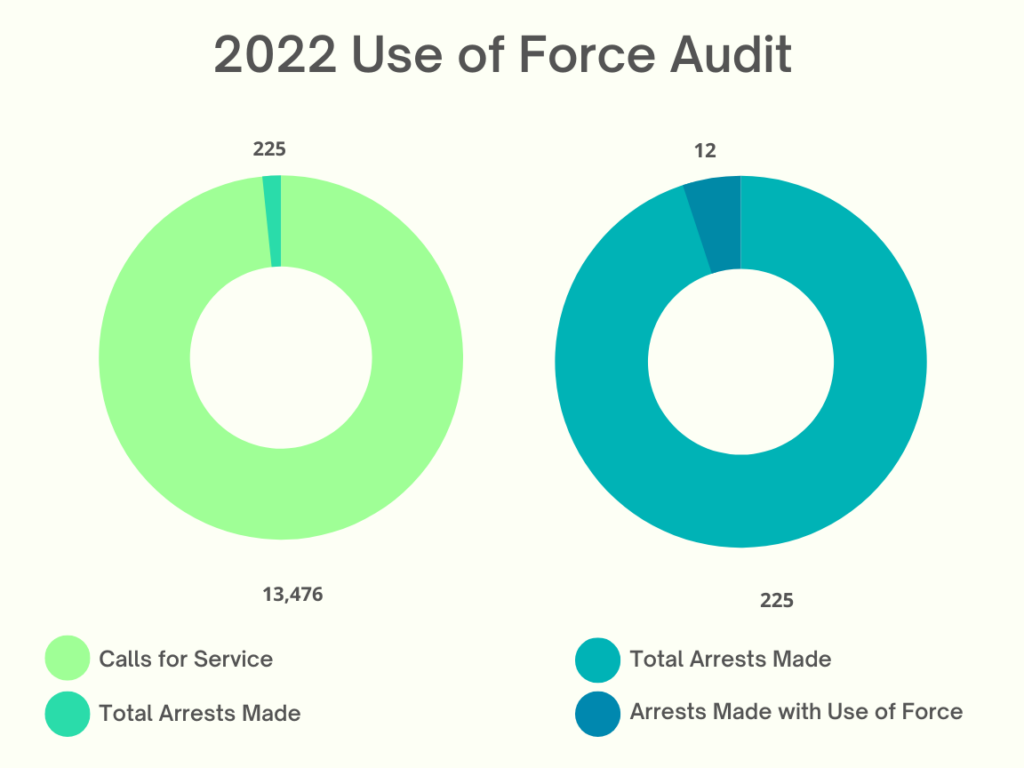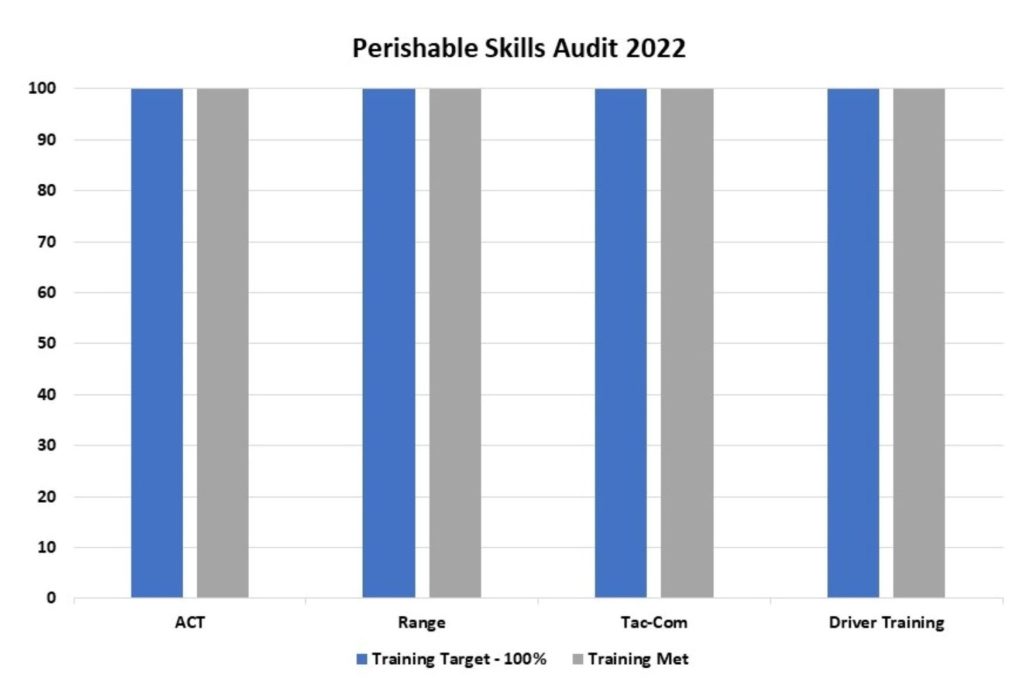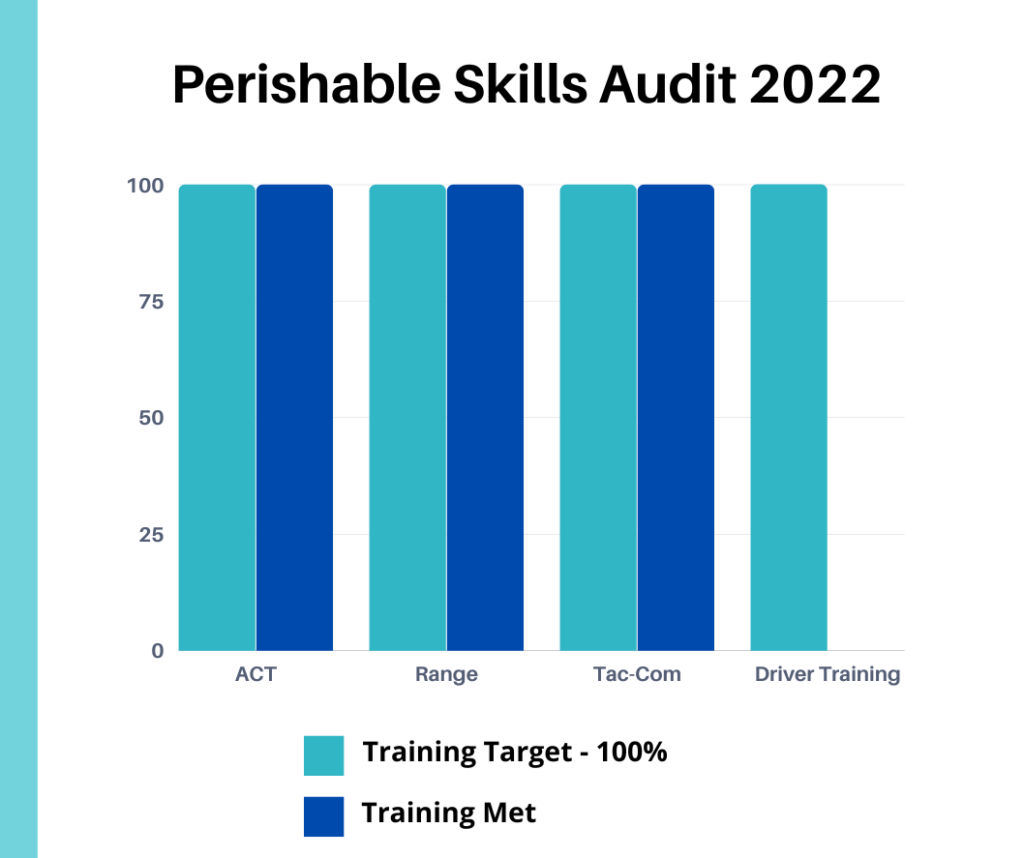Use of Force

- In 2022, the Truckee Police Department initiated and/or responded to 13,476 calls for service.
- During these calls for service, 225 individuals were taken into custody.
- Use of force was reported on twelve (12) of the 225 arrests (.05% of all arrests).
- Of the 12 arrests/incidents where force was used, Officer Physical Contact occurred 10 times and Officer Firearms Display was used 2 times. There were no uses of deadly force. No other forms of force were reported and all incidents of force were reviewed as within policy with no training issues noted.
- It is noted that with 13,476 calls for service in 2022, there were zero (0) civilian complaints.
Requires De-escalation More Information
De-escalation tactics are an essential tool for patrol officers. We provided Crisis Intervention Training (CIT) to all of our officers to deal with all aspects of human emotion during crisis, trauma and combative subjects. In addition, de-escalation training is worked into our firearms training and our defensive tactics curriculum (physical control tactics). We also have robust policies on what crimes we will walk away from the arrest portion of, if the situation escalates and we feel we can seek prosecution through the court system. That same is true for people threatening suicide and wanting to commit “suicide by officer action.” We walk away and retreat from numerous of those situations as well as long as we are highly certain there is no community threat. An additional item that often deescalates and keeps officers calm is our On Officer Camera program. All our officers are audio and video recorded for their entire shift with a camera system that is attached to the officer’s uniform.
Our Police Department culture and our hiring process both address finding experienced officers with high levels of emotional maturity and a true “fit” for Truckee. Most of these tragic events can be traced back to officer’s true connection and desire to be in the community they serve.
De-escalation techniques are unfortunately often portrayed as the singular answer to reducing police use of force. Many critics have come to expect law enforcement to use de-escalation in nearly every encounter—assigning a simple solution to a complicated problem. Law enforcement encounters are not straightforward and are often particularly challenging when involving people with mental health issues.
De-escalation is particularly applicable to persons in crisis situations with limited risk. It should be noted a person who is in a severe emotional crisis or state of “excited delirium” may not be able to comprehend or even hear attempts at de-escalation, which is based on a capacity for communication. Therefore, the situation could exceed the limited risk necessary for effective de-escalation.
While the law does allow for the use of force on persons in crisis, and does not explicitly require the use of de-escalation, it does consider an individual’s mental state (as part of the Graham v. Connor factors test) to determine when use of force is objectively reasonable. Therefore, we believe de-escalation should be used when appropriate and possible. It is critical to identify discretionary time, cause of risk, and who is at risk when determining the proper plan of action. This is not a quick decision, and requires planning and assessment of the person and risk for each situation.
The primary goal of police response in potentially violent situations is to do the right thing for the right reason—protect the person who needs assistance and protect the responding officers.
Bans Chokeholds and Strangleholds More Information
We do not allow any “chokeholds or strangleholds”. We do have policy pertaining to the use of a carotid control hold (Truckee Police Policy 300.3.4). In speaking with our Chief of Police and checking prior records on use of force, there has only been one recorded incident in the history of the Truckee Police Department where this technique has been used during an arrest (circa 2002). We recognize that the best practices in the use of force by police departments is a constantly changing environment and we will continue to discuss whether this is a tactic that we want to maintain in our policy.
Our existing policy does adhere strictly the current best practices in our profession. It requires proper application of the carotid control hold which may be effective in restraining a violent or combative individual. However, due to the potential for injury, the use of the carotid control hold is only allowed after an officer has successfully completed department approved training in the use and application of the carotid control hold.
Furthermore, the carotid control hold may only be used when circumstances perceived by the officer at the time indicate that such application reasonably appears necessary to control a person in any who is violent or physically resisting, and/or the subject, by words or actions, has demonstrated an intention to be violent and reasonably appears to have the potential to harm officers, him/herself or others. The application of a carotid control hold on the following individuals should be avoided unless the totality of the circumstances indicates that other available options reasonably appear ineffective, or would present a greater danger to the officer, the subject or others, and the officer reasonably believes that the need to control the individual outweighs the risk of applying a carotid control hold:
1. Females who are known to be pregnant
2. Elderly individuals
3. Obvious juveniles
4. Individuals who appear to have Down syndrome or who appear to have obvious neck deformities or malformations, or visible neck injuries
Any individual who has had the carotid control hold applied, regardless of whether he/she was rendered unconscious, shall be promptly examined by paramedics or other qualified medical personnel and should be monitored until examined by paramedics or other appropriate medical personnel. The officer shall inform any person receiving custody, or any person placed in a position of providing care, that the individual has been subjected to the carotid control hold and whether the subject lost consciousness as a result.
Any officer attempting or applying the carotid control hold shall promptly notify a supervisor of the use or attempted use of such hold. The use or attempted use of the carotid control hold shall be thoroughly documented by the officer in any related reports.
Duty to Intervene More Information
We have a very extensive policy (Truckee Police Policy 300.2.1) which requires any officer present and observing another officer using force that is clearly beyond that which is objectively reasonable under the circumstances shall, when in a position to do so, intercede to prevent the use of unreasonable force.
An officer who observes another officer’s use of force that exceeds the degree of force permitted by law should promptly report these observations to a supervisor. I can assure you that every member of our organization is very attentive and cognizant of the use of force activities and their duty to act.
We also have a policy that requires officers to adhere to a strict code of conduct (Truckee 340.5.9). Failure of any member to promptly and fully report activities on his/her part or the part of any other member where such activities resulted in contact with any other law enforcement agency or that may result in criminal prosecution or discipline under this policy. The additional policy covers the following:
- Unreasonable and unwarranted force to a person encountered or a person under arrest.
- Exceeding lawful peace officer powers by unreasonable, unlawful or excessive conduct.
- Unauthorized or unlawful fighting, threatening or attempting to inflict unlawful bodily harm on another.
- Engaging in horseplay that reasonably could result in injury or property damage.
- Discourteous, disrespectful or discriminatory treatment of any member of the public or any member of this department or the Town.
- Use of obscene, indecent, profane or derogatory language while on duty or in uniform.
- Criminal, dishonest, or disgraceful conduct, whether on- or off-duty, that adversely affects the member’s relationship with this department.
- Unauthorized possession of, loss of, or damage to department property or the property of others, or endangering it through carelessness or maliciousness.
- Attempted or actual theft of department property; misappropriation or misuse of public funds, property, personnel or the services or property of others; unauthorized removal or possession of department property or the property of another person.
- Activity that is incompatible with a member’s conditions of employment or appointment as established by law or that violates a provision of any memorandum of understanding or contract to include fraud in securing the appointment or hire.
- Initiating any civil action for recovery of any damages or injuries incurred in the course and scope of employment or appointment without first notifying the Chief of Police of such action.
- Any other on or off duty conduct which any member knows or reasonably should know is unbecoming a member of this department, is contrary to good order, efficiency or morale, or tends to reflect unfavorably upon this department
- Requires Warning Before Shooting More Information
The use of warning shots in law enforcement is generally discouraged. We, as first responders, are legally responsible for each and every projectile fired from weapons that we maintain. Those projectiles need to go somewhere when expended from a firearm. In our professional experience, warning shots only put other people at risk and may invite return gunfire from the source of the problem you are trying to stop. Even professional organizations in our industry such as the International Association of Police Chiefs have generally discouraged warning shots except for the most extreme situations.
Ban Shooting at Moving Vehicles More Information
We currently have a policy that highly discourages shooting at or from moving vehicles (Truckee Police Policy 300.4.1) Shots fired at or from a moving vehicle are rarely effective. We urge officers that they should move out of the path of an approaching vehicle instead of discharging their firearm at the vehicle or any of its occupants. An officer should only discharge a firearm at a moving vehicle or its occupants when the officer reasonably believes there are no other reasonable means available to avert the threat of the vehicle, or if deadly force other than the vehicle is directed at the officer or others. We also advise officers that they should not shoot at any part of a vehicle in an attempt to disable the vehicle.
Requires Comprehensive Reporting More Information
We currently maintain very extensive records and video on any use of force that occurs in the Town of Truckee (Truckee Police Policy 300.5 and 300.5.1). Any use of force by a member of this department shall be documented promptly, completely and accurately in an appropriate report, depending on the nature of the incident. The officer is required to articulate the factors perceived and why he/she believed the use of force was reasonable under the circumstances. To collect data for purposes of training, resource allocation, analysis and related purposes, the Department requires the completion of additional report forms, as specified in Department policy, procedure or law. Supervisory notification shall also be made as soon as practicable following the application of force in any of the following circumstances:
- The application caused a visible injury
- The application would lead a reasonable officer to conclude that the individual may have experienced more than momentary discomfort
- The individual subjected to the force complained of injury or continuing pain
- The individual indicates intent to pursue litigation
- Any application of an arrest control or restraint device other than handcuffs, shackles or belly chains
- The individual subjected to the force was rendered unconscious
- The individual was struck or kicked, and/or the individual alleges any of the above has occurred
We also report to the State of California (Truckee Police Policy 300.5.2). All statistical data regarding all officer-involved shootings and incidents involving use of force resulting in serious bodily injury is reported to the California Department of Justice as required by Government Code § 12525.2.
- Requires Exhausting Other Means Before Shooting More Information and Use of Force Continuum
Our use of force policy is quite extensive (Truckee Police Policies 300.3 and 300.3.1). Officers shall use only that amount of force that reasonably appears necessary given the facts and totality of the circumstances known to or perceived by the officer at the time of the event to accomplish a legitimate law enforcement purpose (Penal Code § 835a).
The reasonableness of force will be judged from the perspective of a reasonable officer on the scene at the time of the incident. Any evaluation of reasonableness must allow for the fact that officers are often forced to make split-second decisions about the amount of force that reasonably appears necessary in a particular situation, with limited information and in circumstances that are tense, uncertain, and rapidly evolving.
Given that no policy can realistically predict every possible situation an officer might encounter, officers are entrusted to use well-reasoned discretion in determining the appropriate use of force in each incident.
It is also recognized that circumstances may arise in which officers reasonably believe that it would be impractical or ineffective to use any of the tools, weapons, or methods provided by the Department. Officers may find it more effective or reasonable to improvise their response to rapidly unfolding conditions that they are confronting. In such circumstances, the use of any improvised device or method must nonetheless be objectively reasonable and utilized only to the degree that reasonably appears necessary to accomplish a legitimate law enforcement purpose.
While the ultimate objective of every law enforcement encounter is to avoid or minimize injury, nothing in this policy requires an officer to retreat or be exposed to possible physical injury before applying reasonable force.
Any peace officer may use objectively reasonable force to effect an arrest, to prevent escape, or to overcome resistance. A peace officer who makes or attempts to make an arrest need not retreat or desist from his/her efforts by reason of resistance or threatened resistance on the part of the person being arrested; nor shall an officer be deemed the aggressor or lose his/her right to self-defense by the use of reasonable force to effect the arrest, prevent escape, or to overcome resistance. Retreat does not mean tactical repositioning or other de-escalation techniques (Penal Code § 835a).
The factors used to determine the reasonableness of force are also covered very clearly under our policy (Truckee Police Policy 300.3.2)
When determining whether to apply force and evaluating whether an officer has used reasonable force, a number of factors should be taken into consideration, as time and circumstances permit. These factors include but are not limited to:
- The apparent immediacy and severity of the threat to officers or others (Penal Code § 835a).
- The conduct of the individual being confronted, as reasonably perceived by the officer at the time.
- Officer/subject factors (age, size, relative strength, skill level, injuries sustained, level of exhaustion or fatigue, the number of officers available vs. subjects).
- The conduct of the involved officer (Penal Code § 835a).
- The effects of drugs or alcohol.
- The individual’s apparent mental state or capacity (Penal Code § 835a).
- The individual’s apparent ability to understand and comply with officer commands (Penal Code § 835a).
- Proximity of weapons or dangerous improvised devices.
- The degree to which the subject has been effectively restrained and his/her ability to resist despite being restrained.
- The availability of other reasonable and feasible options and their possible effectiveness (Penal Code § 835a).
- Seriousness of the suspected offense or reason for contact with the individual.
- Training and experience of the officer.
- Potential for injury to officers, suspects, and others.
- Whether the person appears to be resisting, attempting to evade arrest by flight, or is attacking the officer.
- The risk and reasonably foreseeable consequences of escape.
- The apparent need for immediate control of the subject or a prompt resolution of the situation.
- Whether the conduct of the individual being confronted no longer reasonably appears to pose an imminent threat to the officer or others.
- Prior contacts with the subject or awareness of any propensity for violence.
- Any other exigent circumstances




